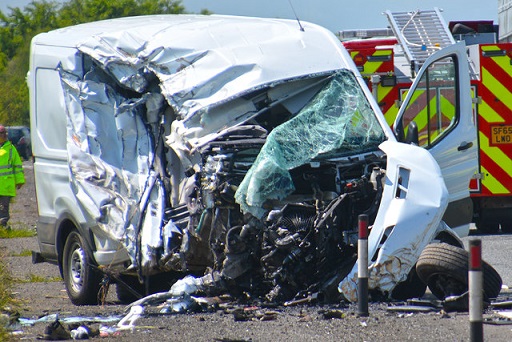
Drivers who kill someone in the most serious cases of dangerous and careless driving will now face life sentences.
Causing death by dangerous driving, or death by careless driving while drunk or on drugs, will carry the top-level punishment.
Jail terms in cases involving mobile phones, speeding or street racing will now be the equivalent of manslaughter, the Ministry of Justice said.
Road safety charity Brake said it was a “major victory” for victims’ families.
It follows criticism that sentences for those convicted over road deaths were too lenient.
The increase will apply to offences in England, Scotland and Wales, but not Northern Ireland, which has separate road safety laws.
Barrister Matthew Scott told BBC Radio 5 live the change would not increase road safety.
Announcing the change, justice minister Dominic Raab said: “Based on the seriousness of the worst cases, the anguish of the victims’ families, and maximum penalties for other serious offences such as manslaughter, we intend to introduce life sentences of imprisonment for those who wreck lives by driving dangerously, drunk or high on drugs.”
A new offence of causing serious injury through careless driving is also to be created.
A woman who lost her partner to a driver distracted by his mobile phone believes a life sentence may be the deterrent needed to make drivers take more care.
Meg Williamson’s Australian boyfriend Gavin Roberts, 28, died after his BMW was hit by a Vauxhall Corsa driven by Lewis Stratford on the A34 in Oxfordshire in June 2016.
Stratford, who was speeding and having an argument with his girlfriend over the phone, admitted death by dangerous driving and was jailed for three years and eight months in March.
Ms Williamson told BBC Radio 5 live that if a harsher sentence had been in place at the time “it might have prevented Lewis from doing what he did”.
She said: “It’s about re-educating people now. I think it might just take that one person to get the life imprisonment if some fatality occurs then people will start to realize this is something serious.”
Ms Williamson met Stratford, who was also badly hurt in the crash, before he was sentenced at Reading Crown Court.
She said the meeting had been difficult but had helped them both move towards “closure”.
She said: “In time I think I will forgive him. It’s something everybody has got to live with.
“He now has to live with the guilt of what he has done and we are all dealing with the fact that somebody is missing from our life on a daily basis.”
The changes follow a public consultation in December 2016 which generated 9,000 responses.
Of them, 70% backed increasing the maximum sentence for death by dangerous driving from the current 14 years to a life term.
Death by careless driving carries a maximum term of five years, increasing to 14 years if alcohol or drugs are involved.
Last week a man who killed a nine-year-old boy while driving at more than double the speed limit was jailed for four years.
Atif Dayaji, 27, had admitted death by dangerous driving after hitting Adam Imfal-Limbada while travelling at about 67mph (108kph) in a 30mph (48kph) zone in Blackburn, Lancashire, in August 2016.
Department for Transport figures show that while three in five killer drivers are jailed, the average sentence is four years.
In 2016, 157 people were sentenced for causing death by dangerous driving and 32 were convicted of causing death by careless driving whilst under the influence, the MoJ said.
Brake has argued that penalties faced by drivers who kill and injure are “grossly inadequate” and cause added anguish to their families.
Jason Wakeford, Brake’s director of campaigns, said: “We applaud the government for at last recognising that the statute books have been weighed against thousands of families who have had their lives torn apart through the actions of drivers who have flagrantly broken the law.”
Mr Scott argued that the announcement was a “crowd-pleasing gesture” and that life sentences “should be reserved for the most serious offences”.
He told BBC Radio 5 live: “Bad though it is and wrong though it is, taking out a mobile phone while driving without any intention to cause death, I don’t consider that is the sort of behaviour that could possibly justify a life sentence.”
Source: bbc.co.uk






Be the first to comment